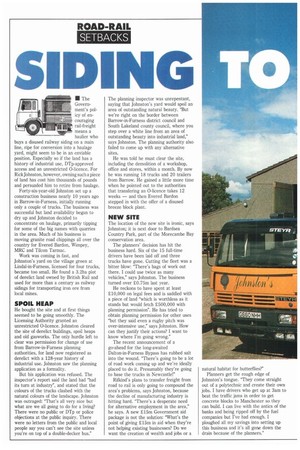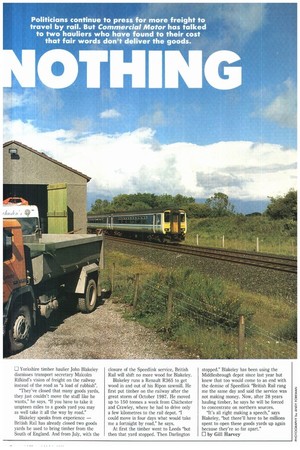DG
Page 34

Page 35

If you've noticed an error in this article please click here to report it so we can fix it.
/The Government's policy of encouraging rail-freight means a haulier who buys a disused railway siding on a main line, ripe for conversion into a haulage yard, might seem to be in an enviable position. Especially so if the land has a history of industrial use, DTp-approved access and an unrestricted 0-licence. For RickJohnston, however, owning such a piece of land has cost him thousands of pounds and persuaded him to retire from haulage.
Forty-six-year-old Johnston set up a construction business nearly 10 years ago in Barrow-in-Furness, initially running only a couple of trucks. The business was successful but land availability began to dry up and Johnston decided to concentrate on haulage, primarily tipping for some of the big names with quarries in the area. Much of his business is moving granite road chippings all over the country for Evered Bardon, Wimpey, MRC and Tilcon Tarmac.
Work was coming in fast, and Johnston's yard on the village green at Lindal-in-Furness, licensed for four trucks, became too small. He found a 3.2ha plot of derelict land owned by British Rail and used for more than a century as railway sidings for transporting iron ore from local mines.
SPOIL HEAP
He bought the site and at first things seemed to be going smoothly. The Licensing Authority granted an unrestricted 0-licence. Johnston cleared the site of derelict buildings, spoil heaps and old gasworks. The only hurdle left to clear was permission for change of use from Barrow-in-Furness planning authorities, for land now registered as derelict with a 128-year history of industrial use. Johnston saw the planning application as a formality.
But his application was refused. The inspector's report said the land had "had its turn at industry", and stated that the colours of the trucks clashed with the natural colours of the landscape. Johnston was outraged: "That's all very nice but what are we all going to do for a living? There were no public or DTp or police objections at the public inquiry. There were no letters from the public and local people say you can't see the site unless you're on top of a double-decker bus." The planning inspector was unrepentant, saying that Johnston's yard would spoil an area of outstanding natural beauty. "But we're right on the border between Barrow-in-Furness district council and South Lakeland county council, where you step over a white line from an area of outstanding beauty into industrial land," says Johnston. The planning authority also failed to come up with any alternative sites.
He was told he must clear the site, including the demolition of a workshop, office and stores, within a month. By now he was running 18 trucks and 20 trailers from Barrow. He gained a little more time when he pointed out to the authorities that transfering an 0-licence takes 12 weeks — and then Evered Bardon stepped in with the offer of a disused breeze block plant.
NEW SITE
The location of the new site is ironic, says Johnston; it is next door to Bardsea Country Park, part of the Morecambe Bay conservation area.
The planners' decision has hit the business hard. Six of the 15 full-time drivers have been laid off and three trucks have gone. Cutting the fleet was a bitter blow: "There's bags of work out there. I could use twice as many vehicles," says Johnston. The business turned over £0.75m last year.
He reckons to have spent at least £10,000 on legal fees and is saddled with a piece of land 'which is worthless as it stands but would fetch £500,000 with planning permission". He has tried to obtain planning permission for other uses "but they said even a rugby pitch was over-intensive use," says Johnston. How can they justify their actions? I want to know where I'm going wrong," The recent announcement of a go-ahead for the long-awaited Dalton-in-Furness Bypass has rubbed salt into the wound. "There's going to be a lot of road work coming up and we're ideally placed to do it. Presumably they're going to base the trucks in Newcastle!"
Rifkind's plans to transfer freight from road to rail is only going to compound the area's problems, says Johnston, because the decline of manufacturing industry is hitting hard. "There's a desperate need for alternative employment in the area," he says. A new £15m Government aid package is not the solution: "What's the point of giving £15m in aid when they're not helping existing businesses? Do we want the creation of wealth and jobs or a natural habitat for butterflies?"
Planners get the rough edge of Johnston's tongue. "They come straight out of a polytechnic and create their own jobs. I have drivers who get up at 3am to beat the traffic jams in order to get concrete blocks to Manchester so they can build. I can live with the antics of the banks and being ripped off by the fuel companies but I've had enough. I ploughed all my savings into setting up this business and it's all gone down the drain because of the planners." LYorkshire timber haulier John Blakeley dismisses transport secretary Malcolm Rifkind's vision of freight on the railway instead of the road as "a load of rubbish".
"They've closed that many goods yards, they just couldn't move the stuff like he wants," he says. "If you have to take it umpteen miles to a goods yard you may as well take it all the way by road."
Blakeley speaks from experience — British Rail has already closed two goods yards he used to bring timber from the South of England. And from July, with the closure of the Speedlink service, British Rail will shift no more wood for Blakeley.
Blakeley runs a Renault R365 to get wood in and out of his Ripon sawmill. He first put timber on the railway after the great storm of October 1987. He moved up to 150 tonnes a week from Chichester and Crawley, where he had to drive only a few kilometres to the rail depot. "I could move in four days what would take me a fortnight by road," he says.
At first the timber went to Leeds "but then that yard stopped. Then Darlington stopped." Blakeley has been using the Middlesbrough depot since last year but knew that too would come to an end with the demise of Speedlink "British Rail rang me the same day and said the service was not making money. Now, after 28 years hauling timber, he says he will be forced to concentrate on northern sources.
"It's all right making a speech," says Blakeley, "but there'll have to be millions spent to open these goods yards up again because they're so far apart."
0 by Gill Harvey
















































































